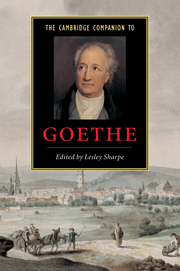Book contents
- Frontmatter
- Introduction
- 1 The world Goethe lived in
- 2 Goethe the writer and literary history
- 3 Goethe the poet
- 4 Goethe the dramatist
- 5 Faust
- 6 Weimar Classicism
- 7 Goethe and the Weimar theatre
- 8 Goethe’s prose fiction
- 9 Autobiographical writings
- 10 In defence of experience
- 11 Goethe and gender
- 12 Goethe and the visual arts
- 13 Goethe and the political world
- 14 Religion and philosophy
- 15 Reception in Germany and abroad
- A guide to further reading
- Index
14 - Religion and philosophy
Published online by Cambridge University Press: 28 May 2006
- Frontmatter
- Introduction
- 1 The world Goethe lived in
- 2 Goethe the writer and literary history
- 3 Goethe the poet
- 4 Goethe the dramatist
- 5 Faust
- 6 Weimar Classicism
- 7 Goethe and the Weimar theatre
- 8 Goethe’s prose fiction
- 9 Autobiographical writings
- 10 In defence of experience
- 11 Goethe and gender
- 12 Goethe and the visual arts
- 13 Goethe and the political world
- 14 Religion and philosophy
- 15 Reception in Germany and abroad
- A guide to further reading
- Index
Summary
Throughout Goethe's childhood and adolescence – as he tells us in his autobiography Dichtung und Wahrheit (Poetry and Truth) – the main focus of his religious awareness was the Bible, which he learned to read not only in Luther's translation but also in its original languages (HA ix, 124-8). He derived early poetic inspiration from it (HA ix, 140-3) and later described it as the main source of his moral education (HA ix, 274). His father's copy of the Vulgate stood on his desk throughout his later years (HA12ix, 731). Although he therefore had little sympathy with those who, like Voltaire, ridiculed the Bible as a tissue of absurdity and superstition (HA ix, 274-5 and 510), his own reading of it was by no means uncritical. After his encounter with Herder in 1770, he came to regard the Old Testament not only as a rich repository of ancient poetry – both he and Herder produced their own translations of the Song of Songs – but also as a historical and anthropological document affording valuable insights into primitive oriental society (HA ix, 129-35 and 511). It followed from this that the Old Testament and its doctrines were of limited relevance to other ages and cultures, including that of modern Europe: their religious significance remained primarily local and Judaic.
- Type
- Chapter
- Information
- The Cambridge Companion to Goethe , pp. 219 - 231Publisher: Cambridge University PressPrint publication year: 2002
- 1
- Cited by

